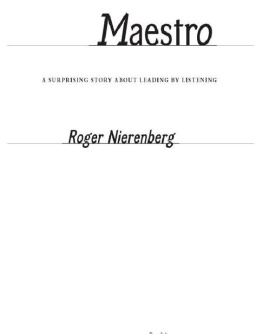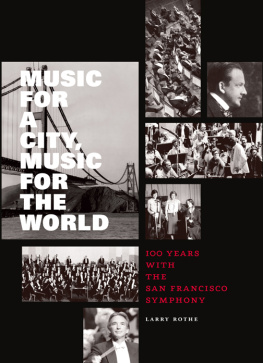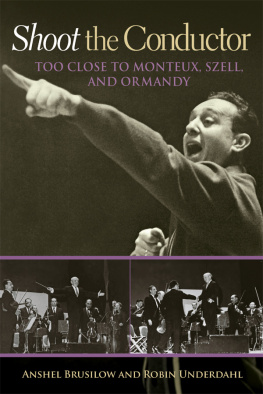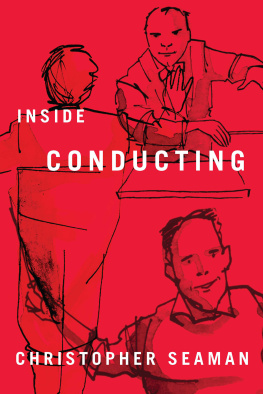Acknowledgments
While the events of this story are the product of my imagination they are all based on actual experience. I have repeatedly sought the counsel of business executives who had engaged me to present Music Paradigm sessions to their organizations. Every scene depicted in these pages did in fact happen. In constructing the story Ive selected those problems and solutions that came up repeatedly in many diverse organizations. I am therefore indebted to the hundreds of executives, consultants and coaches with whom Ive had the privilege of collaborating. Some of them deserve special mention for the important role theyve played in shaping this book.
Paul Kahn was the brilliant visionary who could see the potential value of The Music Paradigm when it was barely a figment of my imagination. He showed me how to turn a possibility into a reality. Stuart Blinder was the remarkable business strategist and innovator whose outstanding success leading the supply chain of Lever Brothers inspired so much of this book. Sheldon Czapnik helped me turn a mountain of anecdotal data into a structured story, and prevented me from going down countless blind alleys. Ed Stanford gave me confidence that the holistic experiential learning of The Music Paradigm could be translated into a book, and infallibly offered sage advice about which challenge to take up next. When I needed a deeper insight or clearer understanding about a particular business issue I would frequently turn to Neville Osrin, Ulrich Nettesheim, Steve Kirn or Ken Kesslin. Their fingerprints can be found everywhere in these pages.
This being my first book, I had no idea that a great publisher could make such a dramatic difference. Adrian Zackheim had the imagination to see what my manuscript draft could become, once he helped me clarify the central ideas, streamline the narrative and drive it forward. Adrienne Schultz helped make every page of the text so much more readable. Will Weis ser and Maureen Cole along with Elizabeth Hayes showed me how bringing the book into the public arena could itself be a creative act.
Maestro would never have been possible without the experience of delivering hundreds of Music Paradigm sessions to organizations throughout the entire world. In each case there were inspired leaders who believed that great music could add enormous value to a business meeting and took the risk of en-rolling their companies in the plan. I know that many put their reputations and careers on the line by strongly advocating for such an out-of-the-box idea. This book is a tribute to them and to the success that they brought to their organizations.
In delivering live orchestral performance to so many meetings I relied on the dedicated support of the Music Paradigm staff. Each of them deserves mention: Myra Hess, Chris Thomp son, Susan Spafford, Margot Johansen, Arlo McKinnon, John Ostrowski, Carol Rosenberg-McCool, Catherine Stewart-Lindley and Jan Thirlby.
For More Information
To learn more about Roger Nierenberg and The Music Paradigm, the unique experience that inspired this story, visit www.musicpara- digm.com
The Music Paradigm is a highly flexible, high-impact learning experience that works equally well for groups as small as 25 or as large as 2,000. Over the past decade hundreds of corporations, financial institutions, government agencies, law firms, not for profits, hospitals, universities, and community organizations around the world have sponsored Music Paradigm sessions for their people. The session provides a memorable group experience that generates fresh insights long after the meeting is over, and lessons that become part of the organizations dialogue and culture.
Are you interested in buying multiple copies ofMaestro for your business, sales organization, school, non-profit, or house of worship? You can receive special discounted pricing, great service, direct shipping, and more through Penguins Business-to-Business advantage program. The program allows your local bookstore to offer special discounted pricing on this book for bulk sales. Call your local bookstore and say youd like to use Penguins B2B program to buy copies of Maestro for giveaway or training.
_____ Maestro 978-1-59184-288-0 $19.95 ($25.00 CAN)
Getting It All Wrong
MY MEETING WAS BEGINNING TO SPIN OUT OF CONTROL.
For the life of me, cried Sarah in exasperation, I dont see why were spending so much time talking about developing this new product when we know that our customers havent shown any interest in it. We have all the research data. It isnt what they want.
I could see that Rick was about to lose it. Look out the window, Sarah, he snapped. Didnt anyone tell you that the economy has changed? Our customers dont know what they want. Your data may seem clear but youre not on the front lines like our salespeople, talking with customers. Look at our numbers, he said, shaking the papers in front of him. They arent even buying their favorite products the way they used to. Our best shot at staying alive out there is to introduce something new.
WellSarahs voice dripped sarcasmif sales could properly execute the plan with our current products thered be plenty of results.
I noticed that Malcolm looked eager to join the debate and I called on him to interject. Its not enough for us to ask what they want. Weve got to understand what they would rush to buy if it were offered.
Now wait a minute, Mike chimed in. Lets not throw out the baby with the bathwater. Weve spent a decade developing an incredible production capacity that keeps costs low and quality high. Lets not start switching to expensive new products. In this economy theyre not going to buy anything unless its at an affordable price. Dont forget that.
Yeah, but are we taking full advantage of the new technologies we can harness? Ethan countered. Weve come up with some groundbreaking ideas we could develop, if sales and marketing wouldnt always shoot them down.
Id seen this type of argument break out in meetings before: the heads of marketing, sales, strategy, manufacturing, and R&D going after one another. I had to stop it now because Id learned that their bickering could degenerate quickly.
Look, everybody, just calm down. This quarreling is getting us nowhere.
I was already in my second month as the head of this troubled division but I didnt seem to be making any progress with my team. When the CEO recruited me, I was charged with reversing our downward slide, and helping to return the company to profitability. Initially I was excited about the seasoned high-level executives who would form my leadership team.
Large or small, every group Id led during my twenty-five-year career had outperformed its expectations. Now this was my chance to bring that kind of success to a team of leaders who were the cream of the crop. I felt confident that my group had the talent to bounce back; it was simply suffering from a lack of strong leadership. And I was eager to prove that my division could guide the company to its former heights.
I soon discovered, however, that this team did not act like the ones Id led before. Despite their skills, these experts had settled into attitudes that were so colored by their diverse professional disciplines that they continually locked horns over whatever issue was up for discussion. For such intelligent people, they were surprisingly blind to any potential common ground between them, or simply unwilling to acknowledge it.
Im determined to move forward on this issue, I announced after yet another fruitless product-development meeting. Im going to schedule one-on-one meetings this week with each of you. I want to hear all points of view and then we can reach a resolution once and for all.








